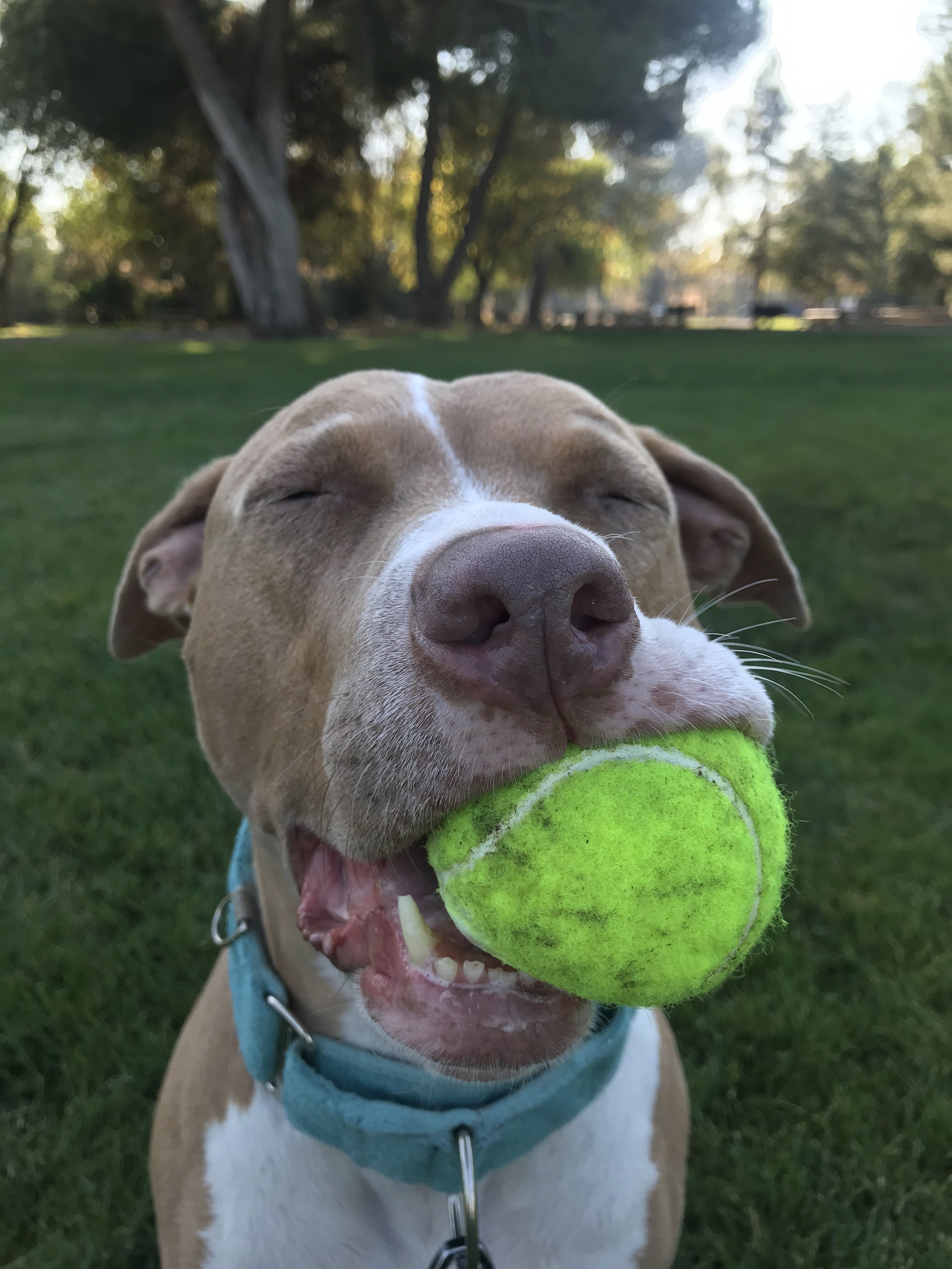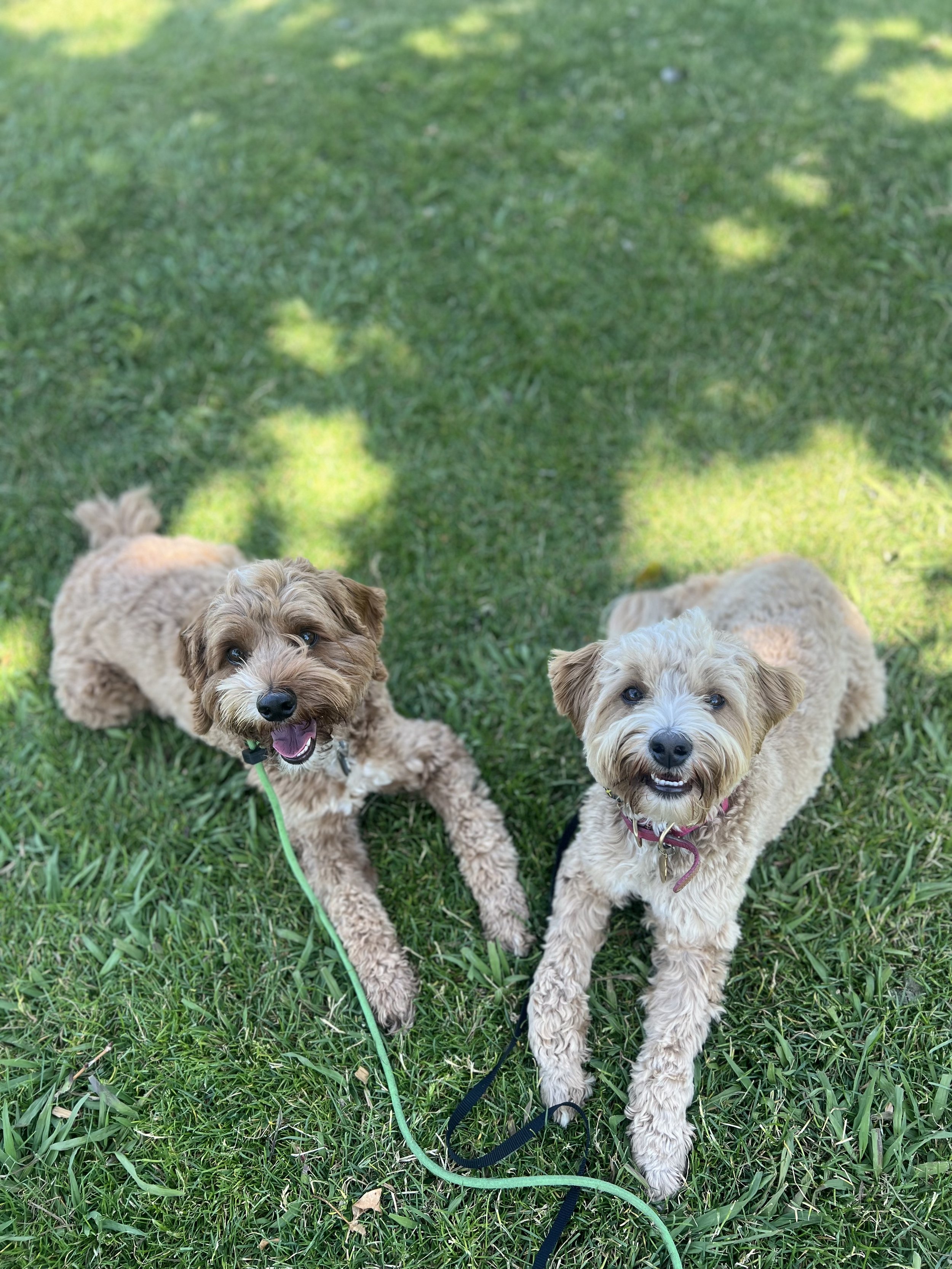Choosing the right dog breed for your family.
If you live in the Bay Area, you may find it amusing to know that there are more dog breeds than children in San Francisco! Adding a dog to your family can be incredibly enriching, but it can also be stressful if you don’t choose the right breed for you or your family. When you’re choosing the right dog breed, it’s important to consider your lifestyle, research breed options so you can understand dog breed characteristics, and understand whether rescuing or buying from a breeder is the best choice for you.
Assessing your lifestyle when choosing the right dog breed.
Kiyah the pit bull enjoying one of her favorite daily activities.
It’s important to consider your activity level, living situation, family dynamics, and capacity when choosing the right dog breed for you and your family.
A lot of people think they want an active dog because they like to hike or go outside, but a really active dog breed can require extensive exercise and training in order to live peacefully in the home. If you want an active dog, maybe you don’t select an exceptionally lazy dog breed, but choosing an average-energy dog breed will provide you with plenty of energy to accompany you on your hikes and adventures in the Bay Area.
When choosing the right dog breed, it’s important to consider your living situation, such as the amount of space you can provide inside, whether you have easy outdoor access, and your neighborhood breed restrictions. Some cities in the Bay Area get really hot in the summer! You will need to consider how to keep your dog safe in the summer, and whether the breed you are considering choosing is suitable for the climate you live in. An xl-breed like an Alaskan Malamute doesn’t make sense for a small apartment in Pleasant Hill, where it can get really hot, for example. It’s not always the case that size is the most important consideration, either—some large dog breeds, like Greyhounds, are notoriously lazy, and could do perfectly fine in an apartment living in San Francisco!
It’s extremely important to consider your family dynamics and family plans when choosing a dog breed. If you have really small children, buying a large, rambunctious puppy or a dog breed with a lot of prey drive may not be such a great idea, for example. If you aren’t sure what kind of dog would make for the best fit for your family, don't hesitate to reach out for help!
Lastly, it’s important to consider your capacity, and how much time you can give to taking care of a dog when choosing a dog breed. A dog that has higher exercise or training needs is going to require more of a time commitment. If you live in a city in the Bay Area where there isn’t easy access to parks or trails, consider how that will add to the time it takes to provide your dog with necessary exercise and stimulation.
The importance of researching dog breeds when choosing a dog
Bogie the Malinois demonstrating why working breeds don’t usually make for the best pets.
I can’t emphasize enough how important it is to research and understand dog breed characteristics when choosing a dog for you or your family. You will want to understand the size, energy level, temperament, and potential special needs of different breeds.
Understanding what a dog breed was originally bred for and the jobs it can perform in today’s world can give you a better idea of whether or not it will be a good fit for your family—for example, most herding breed dogs are not easy dogs for families to live with.
A dog breed that can make for a good police dog or guard dog might also not be the best dog for your family. Some dog breeds have physical characteristics that require unique attention, whether it’s grooming care of a doodle or potential orthopedic concerns of an extra-large dog breed.
Brachycephalic dog breeds (dog breeds with short noses and flat faces), can overheat more easily and can have more genetic deformities that impact how to give them the best quality of life.
Adoption vs. Breeders when choosing a dog breed
There are pros and cons to adoption and buying a dog from a breeder that are worth considering when choosing a dog.
Rescuing a dog from a shelter in the Bay Area can allow you to add an older dog to your family if you want to skip the challenges of raising a puppy. If you foster a dog before adopting it, it can allow you to get a good sense of whether the dog or dog breed you are considering actually is a good fit for you.
Rescuing a dog from a shelter can be really rewarding and allow you to give a sweet dog a second chance at life. A lot of dogs available for rescue are mixed-breed dogs—this means if you rescue a puppy or young dog, there is less certainty about the health and temperament of the dog as it matures. Rescuing a dog can come with a lot of challenges as well. Sometimes rescues don’t properly vet the dogs they save from shelters, and people can end up rescuing dogs that have major behavioral issues, like anxiety or reactivity, that require more extensive training.
Lucky and Honey, Uncle and niece, are awesome doodles from the same breeder. Both excelled in their training programs.
Buying a dog from a breeder has it’s own pros and cons when choosing a dog breed. Buying a dog from a reputable breeder means that the breeder has been carefully selecting dogs with great temperaments and health for many years.
Buying a dog (usually a puppy), from a breeder, means you can get your puppy off to the right track with training and socialization, so that you can end up with a confident, well-trained dog for life. If you select a local breeder in the Bay Area, you may be able to find meet-up groups of other owners who have dogs from a certain breeder, and see whether the dogs that breeder is producing are a good fit for you.
There are some cons with buying a dog from a breeder as well—usually cost is the biggest one. While the idea is that you are paying for a dog who is more likely to end up having the health and temperament you are looking for, if you neglect properly training and socializing your expensive puppy, you can end up with the same challenges someone would if they adopted a dog with issues!
Whether you are choosing a dog from a rescue or breeder, it’s important to do your research and make sure that the breeder or rescue organization has a good reputation, and has reasonable policies like taking a dog or puppy back if it’s not a good fit for you.
Making the final decision when choosing a dog breed
After you have narrowed down your options when choosing a dog breed, try and meet as many dogs as you can of that breed, and foster or baby-sit dog breeds you’re interested in. Watching your friend or family member’s new puppy can be a great way to assess whether or not adding a puppy is the right choice for you! Finally, don’t hesitate to seek guidance from experience dog owners and your local Bay Area dog trainers.


